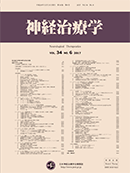34 巻, 3 号
選択された号の論文の65件中51~65を表示しています
シンポジウム5:レジストリー研究
-
2017 年34 巻3 号 p. 278-282
発行日: 2017年
公開日: 2017/10/14
PDF形式でダウンロード (1073K) -
2017 年34 巻3 号 p. 283-287
発行日: 2017年
公開日: 2017/10/14
PDF形式でダウンロード (881K) -
2017 年34 巻3 号 p. 288-292
発行日: 2017年
公開日: 2017/10/14
PDF形式でダウンロード (1598K)
メディカルスタッフシンポジウム:認知症の地域連携
-
2017 年34 巻3 号 p. 293
発行日: 2017年
公開日: 2017/10/14
PDF形式でダウンロード (269K) -
2017 年34 巻3 号 p. 294-297
発行日: 2017年
公開日: 2017/10/14
PDF形式でダウンロード (2234K) -
2017 年34 巻3 号 p. 298-301
発行日: 2017年
公開日: 2017/10/14
PDF形式でダウンロード (2677K) -
2017 年34 巻3 号 p. 302-306
発行日: 2017年
公開日: 2017/10/14
PDF形式でダウンロード (3774K) -
2017 年34 巻3 号 p. 307-310
発行日: 2017年
公開日: 2017/10/14
PDF形式でダウンロード (857K)
原著
-
2017 年34 巻3 号 p. 311-314
発行日: 2017年
公開日: 2017/10/14
PDF形式でダウンロード (595K) -
2017 年34 巻3 号 p. 315-319
発行日: 2017年
公開日: 2017/10/14
PDF形式でダウンロード (1160K)
神経治療最前線 海外学会参加報
-
2017 年34 巻3 号 p. 320-322
発行日: 2017年
公開日: 2017/10/14
PDF形式でダウンロード (1711K) -
2017 年34 巻3 号 p. 323-325
発行日: 2017年
公開日: 2017/10/14
PDF形式でダウンロード (1130K)
-
2017 年34 巻3 号 p. 326-329
発行日: 2017年
公開日: 2017/10/14
PDF形式でダウンロード (370K) -
2017 年34 巻3 号 p. 331
発行日: 2017年
公開日: 2017/10/14
PDF形式でダウンロード (155K) -
2017 年34 巻3 号 p. 332
発行日: 2017年
公開日: 2017/10/14
PDF形式でダウンロード (150K)
